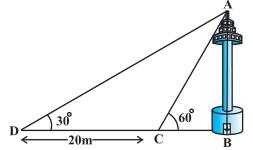1.
The angles of elevation of the top of a rock from the top and foot of 100 m high tower are respectively 30° and 45°. The height of the rock is
2.
If two towers of heights h1 and h2 subtend angles of 60° and 30° respectively at the mid-point of the line joining their feet, then h1 : h2 =
3.
Two poles are 25 m and 15 m high and the line joining their tops makes an angle of 45° with the horizontal. The distance between these poles is
4.
The upper part of a tree is broken by the wind and makes an angle of 30° with the ground. The distance from the foot of the tree to the point where the top touches the ground is 5 m. The height of the tree is
5.
In figure given ABCD is a rectangle, the value of CE is
6.
The tops of two poles of height 20 m and 14 m are connected by a wire. If the wire makes an angle of 30° with horizontal, the length of the wire is
7.
A ladder 15 m long just reaches the top of a vertical wall. If the ladder makes an angle of 60° with the wall, then the height of the wall is
8.
In given Fig., the angle of depression from the observing position D and E of the object at A are
9.
The angle of elevation of top of a tower from a point on the ground, which is 30 m away from the foot of the tower is 30°. The length of the tower is
10.
A plane is observed to be approaching the airport. It is at a distance of 12 km from the point of observation and makes an angle of elevation of 60°. The height above the ground of the plane is
11.
In given figure, the value of angle ACB is
12.
In given figure, the value of CE is
13.
The shadow of a tower is equal to its height at 10:45 a.m. The sun’s altitude is
16.
In given figure, the value of AE is
17.
The angle of elevation of the top of a tower from a point 20 metres away from its base is 45°. The height of the tower is
18.
In given figure, the length of AP is
19.
The angle of depression of a car, standing on the ground, from the top of a 75 m high tower, is 30°. The distance of the car from the base of the tower (in m) is:
20.
The line drawn from the eye of an observer to the point in the object viewed by the observer is known as


